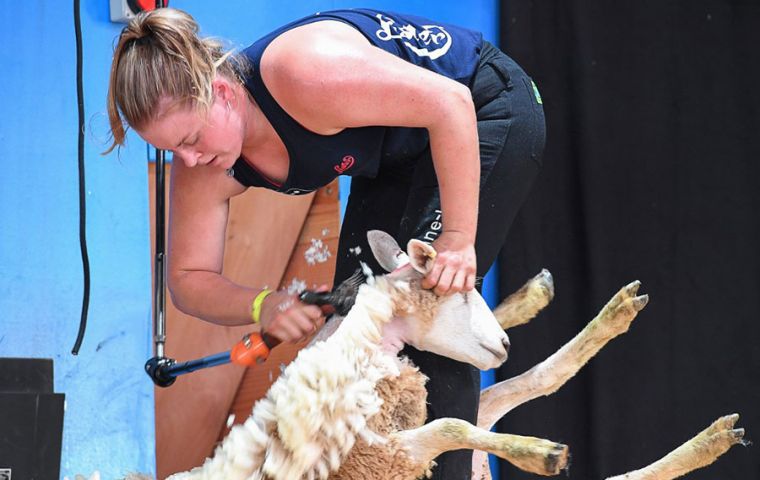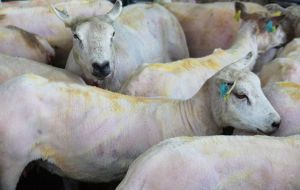MercoPress. South Atlantic News Agency
Falklands' shearers will compete with teams from 34 countries in France
 More than 320 competitors from 34 countries battling to win titles in wool handling, machine shearing and “blade” shearing, a traditional method using scissors. (Pic AFP)
More than 320 competitors from 34 countries battling to win titles in wool handling, machine shearing and “blade” shearing, a traditional method using scissors. (Pic AFP)  And the 5,000 sheep on site will no doubt appreciate a haircut, with temperatures expected to peak at 34 degrees Celsius over the coming days in Le Dorat
And the 5,000 sheep on site will no doubt appreciate a haircut, with temperatures expected to peak at 34 degrees Celsius over the coming days in Le Dorat Sheep shearing experts flocked to a small town in the French countryside on Thursday for the opening of the annual world championship, a four-day event held for the first time on French soil.
More than 320 competitors from 34 countries as far apart as Norway, Japan and the Falkland Islands, are battling it out to win titles in wool handling, machine shearing and “blade” shearing, a traditional method using scissors.
And the 5,000 sheep on site will no doubt appreciate a haircut, with temperatures expected to peak at 34 degrees Celsius over the coming days in Le Dorat, a town in central France.
It is the first time the international competition sets foot -- and hoof -- on French soil, although the town, which is home to 1,800 people, has previously hosted the French sheep shearing championships in 2013 as well as the Six Nations tournament the same year.
Last year, it also welcomed a 24-hour sheep shearing marathon, with six shearers clipping around 2,500 sheep, producing six tons of fleece.
“The world championship, it's so fantastic, so spectacular, we want to share it with the French people,” said Christophe Riffaud, president of the Association for the World Sheep Shearing Championship (AMTM) who has competed in Northern Ireland and the Netherlands.“
Endurance, speed and flexibility -- particularly in the back -- are considered key skills for this iconic rural activity, with professional shearers typically paid per animal.
Competitors in Sunday's machine-shearing final will be tasked with shaving 20 lambs in under 16 minutes. Quality is the most important aspect, making up around 60% of the final grade.
Judges ”check for marks, uncut fleece and uneven levels of shearing,“ the AMTM said on its website.
New Zealand is the favorite to win the world title, after celebrating home-turf victories in the machine shearing and wool handling categories in 2017. South Africa picked up first prize for blade shearing.
Apart from cherry picking the best of the best, the event aims to educate the public about how wool goes from sheep to jumper.
”Ninety percent of French wool gets sent to China to be washed and processed,“ Riffaud said. ”There's not much demand for French wool because of its structure, but we want to promote it as a quality natural product”.
The seven-hectare site is also displaying around 100 exhibits made from wool, including a wedding dress and jeans, in a bid to promote the fruits of the French countryside.




Top Comments
Disclaimer & comment rulesCommenting for this story is now closed.
If you have a Facebook account, become a fan and comment on our Facebook Page!